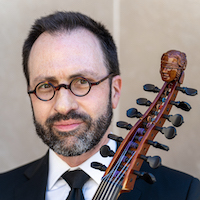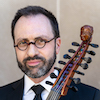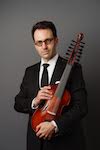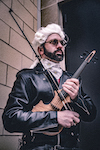 |
|||||||
  Paul Miller is a music theorist, pedagogue and performer.
He served as a
Mellon Postdoctoral Fellow at Cornell University and on the faculties of the
University of Colorado in Boulder and Temple University before earning the
rank of Associate Professor at Duquesne University in Pittsburgh,
Pennsylvania in 2024. He is currently an M.S. student in Computer Science at Duquesne University.
Paul Miller is a music theorist, pedagogue and performer.
He served as a
Mellon Postdoctoral Fellow at Cornell University and on the faculties of the
University of Colorado in Boulder and Temple University before earning the
rank of Associate Professor at Duquesne University in Pittsburgh,
Pennsylvania in 2024. He is currently an M.S. student in Computer Science at Duquesne University.
Paul has presented research at numerous national and regional conferences, and his work has been published in Perspectives of New Music, the American Music Research Center Journal, Twentieth-Century Music, Music and Letters, Opera Quarterly, and Music Theory Online. Further work has appeared in Early Music and the MLA Association’s Notes. An expert on the remarkable music of Karlheinz Stockhausen, Paul studied with the composer for six summers and premiered his solo viola work "In Freundschaft" in Europe and the United States. Paul's research has centered on the use of physical space in musical compositions, the connection between biosignals and electronic music, and the viola d'amore as a historical and contemporary instrument. As a performer, Paul's debut solo album "The Undiscovered Viola d'Amore" with Chatham Baroque was released on the Centaur label in September 2023. The Strad Magazine called Miller's performance "virtuoso", and praised him as possessing "flawless intonation". Paul has appeared at the Metropolitian Museum of Art in New York City, the Library of Congress, the National Cathedral in Washington D.C., the Darmstadt International Festival for New Music, the Bethlehem Bach Festival, the Hawai`i Performing Arts Festival and with ensembles such as El Mundo and Tempesta di Mare. He has collaborated in chamber music concerts with Richard Savino and Jory Vinikour, both Grammy® award nominees. During his tenure as a fellow at Cornell, Paul led the Baroque Orchestra there and studied with Neal Zaslaw, Christopher Hogwood and Malcolm Bilson. He now collaborates regularly with Pittsburgh's Chatham Baroque ensemble. Paul also performs on a five-string electric violin built by the firm Zeta. Since 2020, Paul has worked extensively in the Max/MSP environment. The fruits of his labors include an interspecies interactive multimedia eco-sound installation, a library of music pedagogy patches, a class in electronic instrument fabrication, and several other projects supporting colleagues in the physics and biomedical engineering departments. As a pedagogue with over 20 years of classroom experience, Paul enjoys teaching everything from fundamental skills such as solfege, voice-leading, counterpoint and harmony to more advanced topics such as chromaticism, classical form and post-tonal theory. Paul's newest courses incorporate algorithmic composition, analysis and construction of electronic instruments using microcontrollers that interface with the Max/MSP and Pd environments. Paul is the founder and director of the Music Maker's Lab at Duquesne University. The Lab is a space where students can use state-of-the-art computers, 3D printers, electronics, a sewing machine, and other technologies to fabricate sound and music devices using microcontrollers and other technologies. The Lab also sponsors periodic lectures and presentations by leading artists, technologists and thinkers in the Pittsburgh region. Paul's students have gone on to play important roles in the musical community. They hold full-time and tenured positions at James Madison University, the Pittsburgh Symphony, and serve as the Dean of the Eastman School of Music. Paul earned a Ph.D. from the Eastman School of Music and a Master's in viola performance (studio of John Graham). Paul's undergraduate studies were at Vassar College, New England Conservatory and Harvard University. Most recent CV Sound Lab || Hypereuclidean Sets || GitHub Past Programs from The Duke's Music Bach Suites Project || Plant Music || Vigenère cypher Metanoic Echos: an interspecies, interactive multimedia eco-installation Semita: interactive Max/MSP patches for music theory Exploring Islamic music and music theory || Vidéothèque |
|||||||
 On Centaur Records with Chatham Baroque and Justin Wallace On Amazon.com On Bandcamp Volume 2: Suites 4 -- 6 Electric Ensembles: Music of J. S. Bach, Corrette and Telemann(possibly Wilhelm Friedrich) Niku Niwa -- by Devon Tipp/Paul Miller Joseph Haydn: String Quartet op. 33/2, "The Joke" Other Recordings Viola d'amore J. S. Bach -- Sarabande from the second suite for unaccompanied violoncello, BWV 1008 J. S. Bach -- Gigue from the second suite for unaccompanied violoncello, BWV 1008 With the Bethlehem Bach Festival J. S. Bach -- Betrachte from the John Passion J. S. Bach -- Erwäge from the John Passion With Thomas Georgi I am playing the second part. Huberty -- Duo for two violas d'amore Baroque violin I play both parts on the following recordings. Self-performed, produced, edited, etc. Recorded at Annabel Taylor Chapel on the lovely Cornell University Campus when I was a postdoc there. Leclair: Duo for two violins in E Major, op. 12 I. Allegro ma poco | II. Largo | III. Minuetto -- Altro | IV. Allegro Electric violin Using a Zeta 5-string electric violin and various effects on a Roland GR-55 synthesizer. Jean-Luc Ponty -- Pizzy Cat Video I invite you to visit my YouTube Channel for my curated videos. Marini: Sonata con due corde with Justin Wallace and Patricia Halversion || Duquesne University || 30 September 2017 Synthesizer Etudes and Experiments nothings || pentatonic ripples || Help us fill this space! || untitled requiem |
|||||||
 Music from Plant Biosignals: A Conceptual and Analytical Orientation Music Theory Online, Volume 30.1 (March 2024), with Christopher Cox. A new collection of viola d'amore music from late 18th century Bohemia Early Music, Volume 45/4 (30 December 2017), pp. 613 - 627. An Adventure in Outer Space: Stockhausen's Lichter-Wasser and the Analysis of Spatialized Music Perspectives of New Music, vol. 50 (2012), pp. 342 - 392. Serial Minimalist or Minimal Serialist? The Music of John McGuire American Music Research Journal, vol. 21 (2012), pp. 1 - 39. Meredith Monk's ATLAS in Los Angeles -- in Opera Quarterly, spring 2020. Stockhausen in Basel and Paris: Donnerstag in a New Light Opera Quarterly, vol. 32/4 (December 2016), pp. 321 - 327. Mary Bauermeister and Karlheinz Stockhausen: A Collaboration in Sound and Space in Mary Bauermeister: The New York Decade, ed. Linda Muelig (Northampton, Massachusetts: Smith College Museum of Art, 2014), pp. 87 - 97. Metamorphosis in Music: The Compositions of György Ligeti in the 1950s and 1960s MLA Notes, (September 2019), pp. 118 - 122. Perspectives for Contemporary Music in the 21st Century MLA Notes, vol 75/1 (September 2018), pp. 106 - 109. The Musical Legacy of Karlhein Stockhausen: Looking Back and Forward MLA Notes, vol. 74/2 (December 2017), pp. 281 - 84. Furchtlos weiter: The Written Legacy of Stockhausen (Review-Article) Music and Letters, vol 97/2 (May 2016), pp. 316 - 26. Tombeau: Facsimilies of the Draft Score and the First Fair Copy of the Full Score Music and Letters, vol 95/3 (August 2014), pp. 487 - 89. From Boulanger to Stockhausen: Interviews and a Memoir Music and Letters, vol. 95/3 (August 2014), pp. 484 - 87. Stockhausen: A Theological Interpretation Music and Letters, vol 94/4 (November 2013), pp. 712 - 715. Ich hänge im Triolengitter: Mein Leben mit Karlheinz Stockhausen Twentieth Century Music, vol. 9, issues 1-2 (March 2012), pp. 221- 227. Concerto for Two Violas D'Amore A concerto, c. 1800, attributed to Franz Götz. I made this score from manuscripts in the Czech Museum of Music, Prague. The realization involved a considerable amount of work decyphering the scordatura notation for the viola d'amores, not to mention the flageolet notation. |
|||||||

Photos by Michael Will, Pittsburgh PA and Steve Groves (stevegrovesphoto.com). |
|||||||
 To provide plenty of context, I've included the full review in each of these PDF files. In The Strad, review of my recording "The Undiscovered Viola d'Amore" Boulder Bach Festival, 2022 Bethlehem Bach Festival, 2017 Boulder Bach Festival, 2014 Vivaldi Concerto, 2013 Vivaldi Concerto, 2012 |
|||||||
Last updated on 22 May 2025. |




